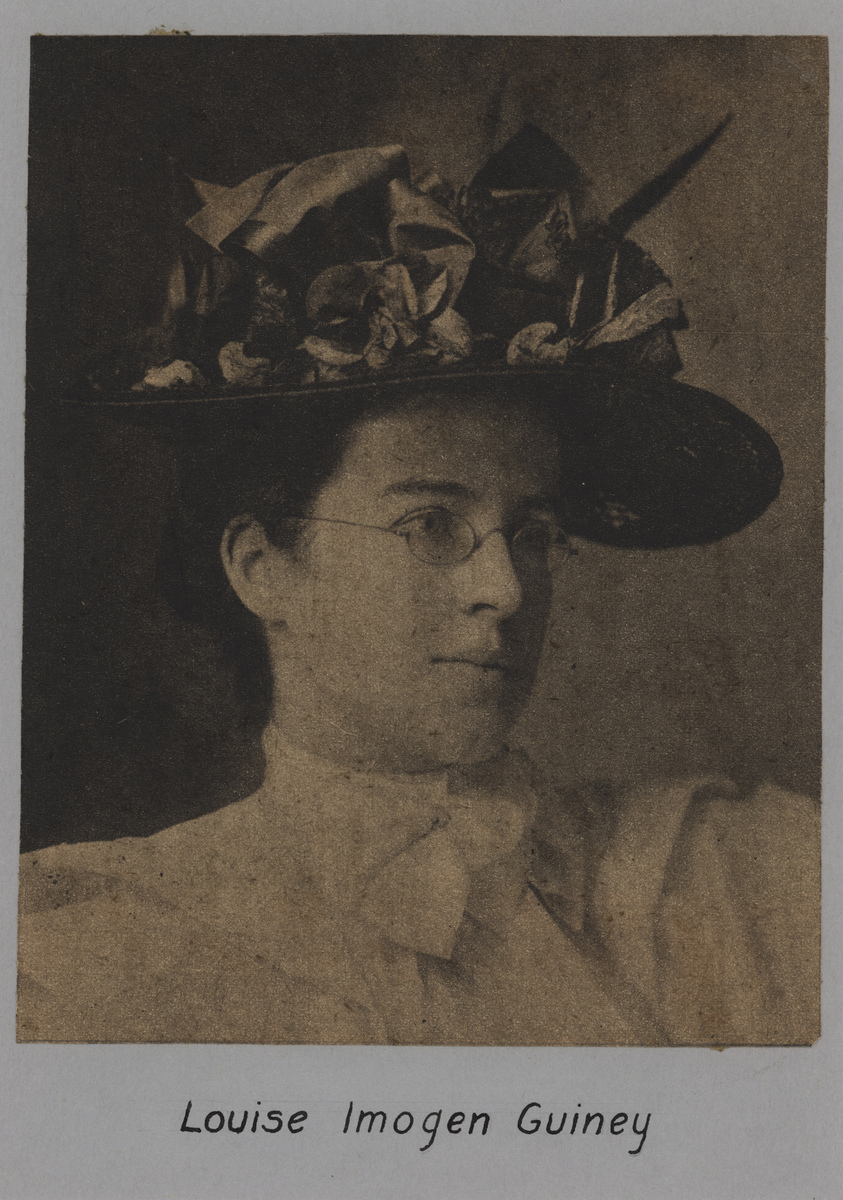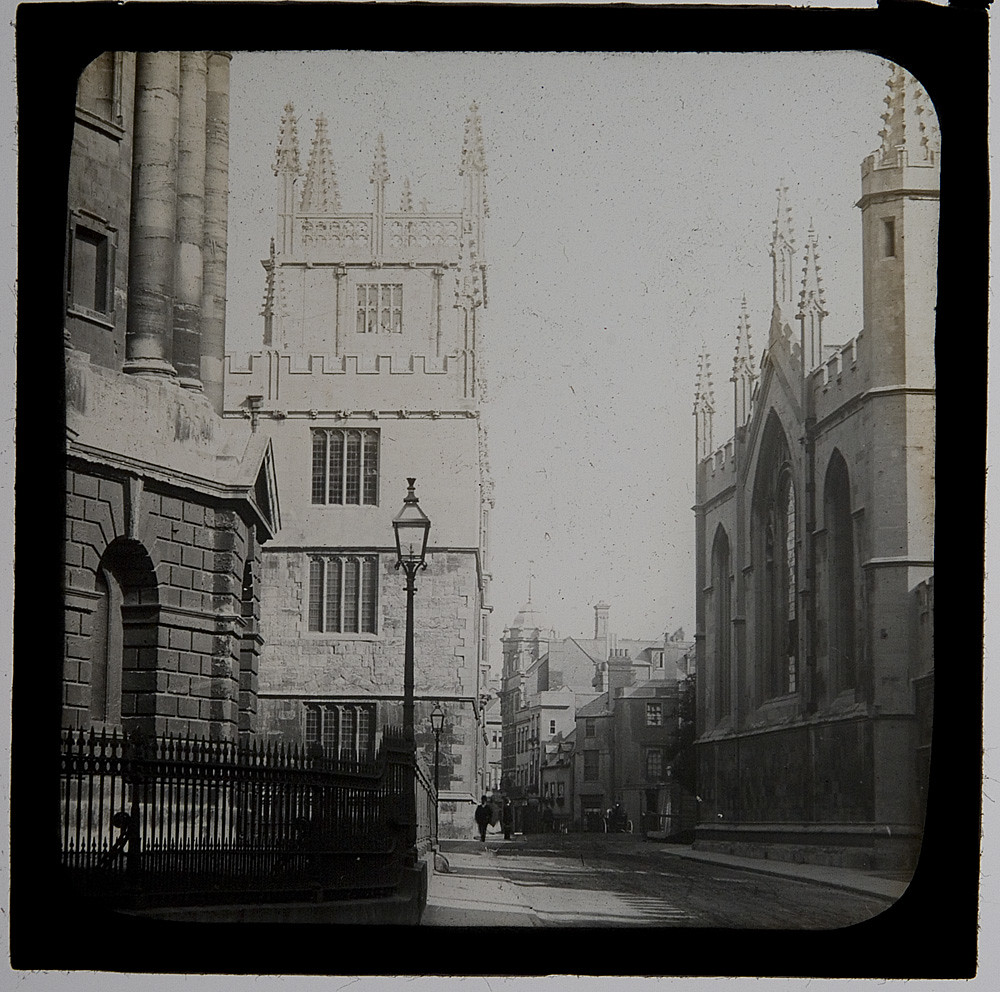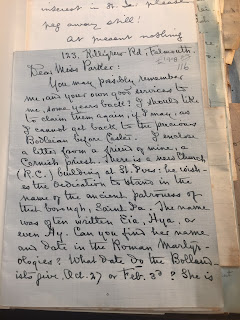This is the fifth in a series of posts about my Humfrey Wanley
Fellowship project, in which I am exploring the Bodleian libraries'
unofficial research department in the early twentieth century through
the letters of the Parker family, found in the Library Records
collection. The first post, which explains the scope and background of
the project, is here; there are also posts for week 1; week 2; and week 3.
Harriet really was gathering material, in a leisurely way, for a study of Lefanu, though the Bodleian was not, perhaps, the ideal source for it. But there must be some reason given for her presence, and Oxford is willing enough to believe that the Bodleian is the hub of the scholar's universe. She was able to find enough references among the Periodical Publications to justify an optimistic answer to kindly inquiries about her progress. ~ Dorothy Sayers, Gaudy Night
'Please excuse the most disorderly letter ever written' the American essayist and poet Louise Imogen Guiney (1861-1920) began one of her many letters to Bodleian paleographer and copyist Evaline Parker (1881-1966). An illustration shows what Guiney means by a disorderly letter:
 |
| Letter from Louise Imogen Guiney to Evaline Parker, 27 June 1910. Library Records d. 408. Photo: Hope Williard, Courtesy of Bodleian Libraries. |
Not only is letter overwhelmed by glued-on postscripts of various lengths and orientations, part of the postscript is cross-written over the beginning of the letter, giving an irresistible impression of energetic enthusiasm. Guiney's forty-odd letters in the Library Records collection are delightful: the products of a gifted and intelligent writer who was head-over-heels in love with the Bodleian.
 |
| Louise Imogen Guiney, Loyola University Chicago Special Collections. |
Louise Guiney was born in Boston, educated in Providence, and began her career as a professional poet, a calling which brought her literary success but no steady income. She first came to England with her mother in 1889, funding their travels by means of travel letters for the Boston Post newspaper, and from 1901 onward was mostly based overseas, getting to Oxford whenever her health and finances permitted.
Of her experiences working in the Bodleian, she wrote in one of her many magazine publications:
One never hears the sound of wheels and hoofs the while, but only the agreeable swish of academic gowns and the year-long voices of birds; and a current of keen fresh air (by the exercise of unique virtue in a library) sweeps from one transept to the other as a daily matter of course, subduing and keeping sweet the musty breath of antiquity. The accommodations for readers are recklessly generous: one has the widest of desks, a thoroughly comfortable chair, good ink, pens, and paper, and bookstands if they be needed. (There is no artificial light on foggy days and there is little heat in winter this is to remind the sybarites of Oxford of the Dominus illuminatio mea, and of that warmth which is not carnal accendat in nobis ignem sui amoris.) The labour-saving devices of our latter day are discountenanced: light-footed boys bring priceless MSS. in their arms and books not marked as reserved for the morrow's study are gathered up again in the same obvious manner and carried in baskets' down the winding staircases and off into the far corners sacred to bequests of Ashmole or Selden, Rawlinson or Douce. At the more recent end, the Carolian end, of the great room stands in its quaint framework a good-humoured but authoritative big bell of the year 1600, a personal friend of the second founder, which rings in and rings out the enchanted seven hours of a working Bodleian day. The library staff has a truly inexhaustive courtesy such as men sadly agree to call the lost courtesy of yesterday. Even the catalogue can hardly be called modern, but you love it while you suffer from it. ~ 'The Three Hundredth Birthday of the Bodleian Library', the Sphere, Saturday 11 October 1902, p. 34.
 |
| "Oxford - Radcliffe Camera, Bodleian Library, & Hawksmoor's Codrington Library (All Souls College), c. 1900" by whatsthatpicture is licensed under CC BY-NC 2.0 |
When she needed materials copied or was not in Oxford, Guiney wrote to correspondents at the Bodleian for help. She seems to have been in contact with the Parker family, especially Evaline Parker, from 1903 onward. In March 1903, she facilitated copying for a Mr Gibbon, who kept losing the Parkers' address and writing to them through friends; and in September 1903 pronounced herself very satisfied with a transcription she had requested for her own work.
The bulk of the correspondence dates from between 1908 and 1911, when Guiney was collecting material for her study of seventeenth century English Catholic poets, published posthumously as Recusant Poets, editing the works Henry Vaughan and William Alabaster, and working on various historical essays. The first letter of the series concerns her efforts to gather enough historical evidence to persuade the Bishop of Bristol to dedicate the newly-established Catholic church of St Ives to St Ia.
 |
| Louise Imogen Guiney to Evaline Parker, 8 March 1908; Library Records d. 408. Photo: Hope Williard, Courtesy of Bodleian Libraries. |
Dear Miss Parker,
You may possibly remember me, and your own good services to me, some years back? I should like to claim them again, if I may, as I cannot get back to the precious Bodleian before Easter. I enclose a letter from a friend of mine, a Cornish priest. There is a new Church (R.C.) building at St Ives: he wishes the dedication to stand in the name of the ancient patroness of that borough, Saint Ia. The same was often written Eia, Hya, or even Hy. Can you find her name and date in the Roman Martyrologies? What date do the Bollandists give, Oct. 27 or Feb. 3rd? She is supposed to have been a sixth-century Irish princess, one of the missionary band martyred at Hayle on the south coast of Cornwall. Whatever you can discover will be welcome. (The only references I now know are Baring-Gould, and Smith's Dict. Christ. Biog.) Old Irish Martyrologies would be likely to have her. Look up, too, the point underlined by me in the letter. All this at your leisure.
But as soon as you find it convenient, I should be grateful to have you give me two Latin texts for Zechariah, IX, 17, "For how great is His goodness" etc: one as it stands in Beza (1519-1605), one as in the Vulgate Bible.
Best wishes from yours faithfully,
Louise I. Guiney
Her research in 1908 seems to have focused on seventeenth-century poets John Denham, William Cartwright, and Richard West; when called back to America by her mother's illness late that year, part of Guiney's preparations for her departure focused on gathering what she might need for her work.
 |
| Louise Imogen Guiney to Evaline Parker, December 1908. Library Records, d. 408. Photo: Hope Williard, Courtesy of Bodleian Libraries |
December 1908
Dear Miss Parker,
Could you possibly let me have these refs. to Twyne Mss? and I will most gladly apply to the Registrars for the needed permission and I thank you for telling me how to go to work. Unfortunately, in view of my going back to America next month (for a quite indefinite period) I have packed away all my reference papers except those needed for my own final explorations at 'the ever-blessed Bod.' and unless you happen to have preserved my note, I shall be in a muddle! I got home from Winchcombe late last evening, and found your letter awaiting me here.
With every best wish, yours,
Louise I. Guiney
Once established back in Boston, Guiney relied on Parker to keep her supplied with transcripts and references from Oxford.
 |
| Louise Imogen Guiney to Evaline Parker, 1 February 1909. Library Records, d. 408. Photo: Hope Williard, Courtesy of Bodleian Libraries |
February 1, 1909
Dear Miss Parker:
Many thanks for the very nice transcripts from the Twyne Mss which came two days ago, and for which I enclose the 8s due. You will not be able to lose touch with me, for I shall from time to time need an intermediary at the well-beloved Bodleian. I can hardly realise as yet that I have Gone Down in such a whole-sale fashion! There is deep snow here, and severe cold, but plenty of sun too.
Yours faithfully,
L.I. Guiney
Auburndale, Boston, Massachusetts, USA
Throughout 1909, Guiney regularly sought references and transcripts from Oxford, and passed on greetings to the friends she had made in the library.
 |
| Louise Imogen Guiney to Evaline Parker, 7 April 1909. Library Records d. 408. Photo: Hope Williard, Courtesy of Bodleian Libraries. |
7 April 1909
Dear Miss Parker,
You see I am by no means independent of your kind serviceableness as yet! You are to consult your own convenience entirely in regard to time, etc. Please remember me to Mr Gibson, and also to Miss Stark. How I miss that old musty H-shaped building words cannot say.
Yours with best wishes,
L.I. Guiney
After her mother's death in February 1910, Guiney did not write again until she had returned to England in June. The seventeenth century continued to fascinate her; and that summer she started working on a study of Oliver Cromwell's conscience, for which she requested references.
August 1 1910 c/o Mrs Harrison, Church St, Ashbourne, Derbyshire
Dear Miss Parker,
Please help me once more! and I will not bother you again for some time. I am following up some interesting Royalist allegations in regard to my Lord Protector and wish to collate some passages, but cannot get up the energy to leave this bookless hermitage just for that. If you are in Oxford and can attack the enclosed references at the Bodleian at once, I shall be much delighted. The ones I have put X against are the ones I want to hear from first; the other four might follow later. The old writers, and Mozley, if he has anything to say about Oliver's looks or supposed bad conscience, are most to my purpose. Kindly copy out all essential passage on the two points named, and send results to this address.
Yours gratefully,
L.I. Guiney
 |
| Louise Imogen Guiney to Evaline Parker, 1 August 1910, Library Records d. 408. Photo: Hope Williard, Courtesy of Bodleian Libraries |
...Please search all these (by indexes or otherwise) for two points only:
1. Any description of Oliver's face which mentions gloomy-looking eyes or lips unusually red.
2. Any description or analysis of an uneasy conscience breeding such fears as made him wear armour under his clothing, etc especially as affecting the gloomy looks aforesaid.
While the article seems never to have been published, Guiney's love of the Bodleian, and its place at the centre of her scholarly universe, continued unabated. After the death of Bodley Librarian, Edward Nicholson, whose uncompromising efforts to modernise the library left him with a divided legacy, Guiney wrote to her friend Strickland Gibson, an assistant at the library:
Dear Mr. Gibson, This is nothing to answer. I only wanted to tell you that I have sent a few paragraphs to the Oxford Times (to be in print, I suppose, this coming Friday) about Mr. Nicholson; I should like your eye to see it there. I hope it shows no undue heat, but it is astonishing to me to hear such remarks about him as I have lately heard from several North Oxford quarters, and I could but do my best to thwart them. I can't bear it, this stupidity which finds petty faults in so large-souled a man. As you imagine, Bodley won't seem the same place to me. I really loved him much. You have all my sympathy in the loss of so good a friend.
Yours ever sincerely,
L. I. Guiney (published in Grace Guiney, Letters of Louise Imogen Guiney)
It is hard to keep one's daily rounds unperturbed, with the German "frightfulness" likely to burst at any moment over the adored spires of Oxford. A bomb on the Bodleian, — and certainly my life, for one, would be worth little thereafter. (3 February 1915, published in Grace Guiney, Letters of Louise Imogen Guiney)
After her death in 1920, a small collection of Guiney's research notes were donated to the Bodleian by her executors. There are several collections of her letters in American libraries (including the Library of Congress, Loyola University Chicago, Vassar, and Wellesley) but the letters to the Parker family seem to be little known and I hope that this post serves to bring them to greater attention. Guiney's letters to Evaline Parker shed an interesting light on her scholarly work and her life in England. Given her long and passionate love for the Bodleian, one imagines her being rather pleased that her letters became a part of it.
Further Reading
Henry G. Fairbanks, Laureate of the Lost: Louise Imogen Guiney (New York, 1975)
Grace Guiney, Letters of Louise Imogen Guiney, 2 vols (New York, 1926)
Louise Guiney, Recusant Poets (New York, 1939)
Eva Mabel Tenison, Louise Imogen Guiney, Her Life and Works, 1861–1920 (London, 1923)
For those interested in a recent collection of essays published on Louise Imogen Guiney's life and works, which includes selected poems and prose, you might like to visit the following website: https://louiseimogenguiney.blogspot.com/
ReplyDeleteThank you very much indeed for the recommendation! I will have to purchase a copy.
Delete